
|
Curriculum
" River Park has the most dedicated staff I have seen anywhere, and the fact that they have been at River Park so long demonstrates their commitment to their work." - Mary Gerson, Public School teacher
Description of Curriculum Disciplines
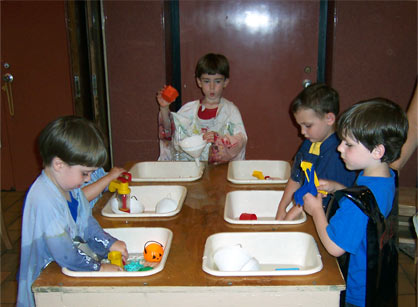
Reading.
Our reading program is entwined with everything we do at River Park . It is not a separate learning experience, but incorporated into every activity and play situation throughout River Park\'s program. Using a reading readiness approach, we work toward building a foundation full of skills and thinking processes that will support children when they are ready to start decoding the symbols used in our English language. Pictures of our toys are used to introduce a 2-dimensional representation of 3-dimensional objects. Visually predictable experiences are provided with pictures, letters, and objects on matching and sequence cards. Children are engaged in visual discrimination experiences. Left to right directionality is promoted by book reading. Puppetry, bookmaking, recording children\'s words verbatim, cooking from large recipe charts, creating experience charts, labeling classroom furniture and using signs during play are other reading readiness experiences that also contribute to formal reading.
Writing is not a separate part of reading, and we often record the children\'s words during teacher and child directed activities. We do print exactly as words would appear in books using upper and lowercase letters, but when we take dictation from a child, we do not correct their grammar or pronunciation. Our planned activities focus on helping children understand the connection between reading, writing, thinking and talking.
Science.
River Park teachers use the word "sciencing", which means learning through investigation, to explain the scientific and natural world to our students. Through the use of items from the classroom and beyond, the children have opportunities to explore and make discoveries about themselves, their environment and how different properties, such as heat, cold, evaporation, mixing, cause changes. Most experiments have a goal, but children are encouraged to redo their explorations many times before they draw conclusions. Experimentation can be altered by other factors or different approaches, and here at River Park we like to keep that in mind. Nature, environmental objects, cooking, water experiments, light experiments, human body studies, hygiene and health are some topics for units that we explore during the year.
Math.
We focus on logical thinking rather than just numbers. It is not necessarily the answer that is most important, but rather the way that one arrives at the answer. Teacher-directed activities encourage the development of ordering by size, comparing similarities, matching, classifying by one or more attributes and establishing one to one correspondence. There are many concrete number experiences that encourage dialog and that support the logical thinking which leads to comprehensive abstract thinking.
Creative Arts.
All children are born with the ability to invent and appreciate art. All children are born with the capacity to create and to enjoy music. Music and art are two of the few activities that engage both hemispheres of the brain at the same time.
Art.
Self expression is explored through open-ended, child-centered art activities. Non-representational experiences, which eventually lead to representational creations, allow children to have successful creative encounters every time they participate. Our art projects, using both natural and manufactured materials, are often thematically base.
Music.
Music is an integral part of the creative experiences provided here at River Park , and it is enjoyed primarily as a self expressive activity. Singing, listening games, dancing, movement, playing instruments, listening to records and music tapes, and making instruments are musical activities that take place throughout the year. We also use song to announce and smooth out our transitions during the day. Musical dynamics, pitch and rhythm are concepts we explore during these activities. Music from different cultures is introduced to the children throughout the year.
Social Studies.
We use both our River Park families and teachers to explore the world\'s many cultures and heritages, and their similarities and differences. Our classroom is the first society away from home for most children here in the nursery school. We also step outside our school and use the community to explore the different occupational roles around us. Trips to local shops, setting up cultural museums which are hands-on experiences for the children, reading books, listening to and telling stories, and using illustrative charts also broaden our scope of the world around us. We also explore different cultures through celebration, and create cultural connections between peoples using song, story, food, clothing, jewelry and other artifacts and family life. Parents are invited into the classroom to enrich our program by sharing their talents, professions and their cultures.
Overview of class activities
River Park\'s mixed-age classroom and diverse student body provide a lively and inviting atmosphere for learning from each other, as well as from our formal program. Within the classroom setting, we provide a varied and well-balanced curriculum designed to promote growth in all facets of the whole child .
Using a planned daily schedule, each child participates in the following disciplines:
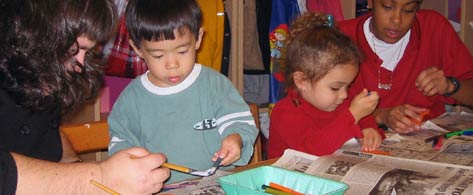
Creative Activities - foot-painting, singing, dancing, 3-D sculpture, clay, jewelry, music and movement, making and playing instruments, and manipulative table toys; cooperative dramatic play, block building and children\'s art exhibition.
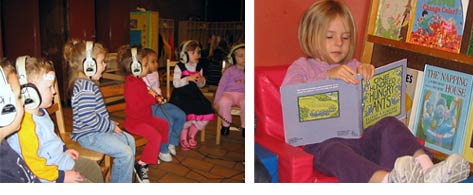
Language Arts Activities - listening to and creating stories, dramatizing stories, book reading with families, puppetry, bookmaking, cooking from recipe charts, visual and auditory perception games, having group discussions, show and tell, borrowing from our lending library and working in our writing center.
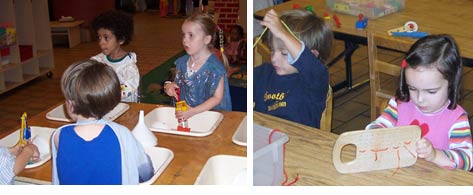
Science and Math Activities - simple experiments, caring for pets, cooking, classifying by one or more attributes, ordering by size, exploring the seasons, the environment and oneself, measuring time sequences with a calendar, estimating, simple machines, and creating and perceiving patterns.
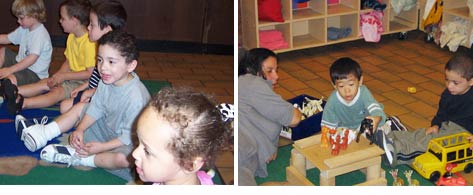
Social Studies Activities - daily general group meetings, our job chart, voting, hands-on cultural museums, foods and dress-ups from around the world, emphasis on cooperation and working together, trips to the firehouse and local public library, and discussions and celebrations of different cultural holidays.
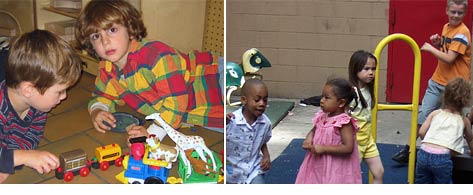
Physical Activities - circle and ball games, balancing, tumbling, climbing, riding toys, jumping rope, daily outdoor activities in our enclosed playground and around our neighborhood - including trips to Central Park - or with portable climbing equipment on rainy days.
|

|






